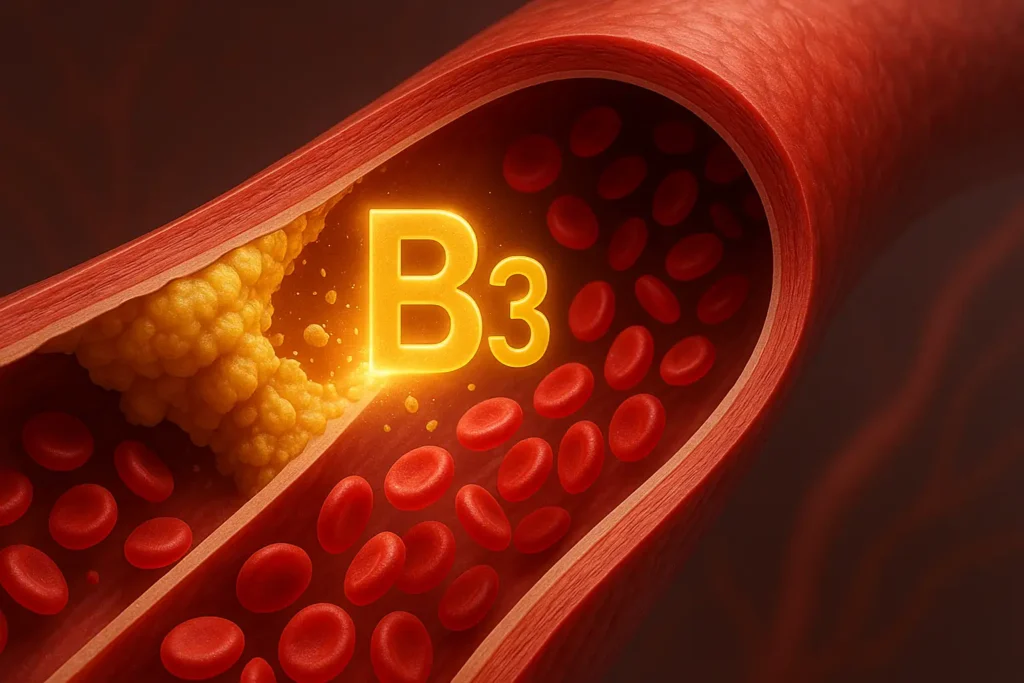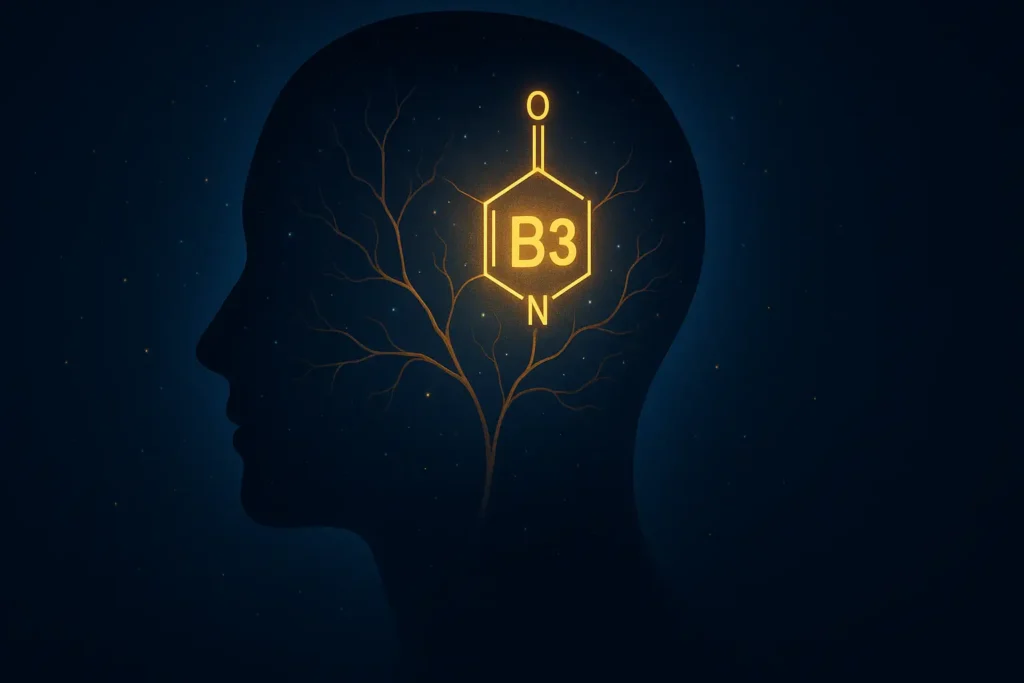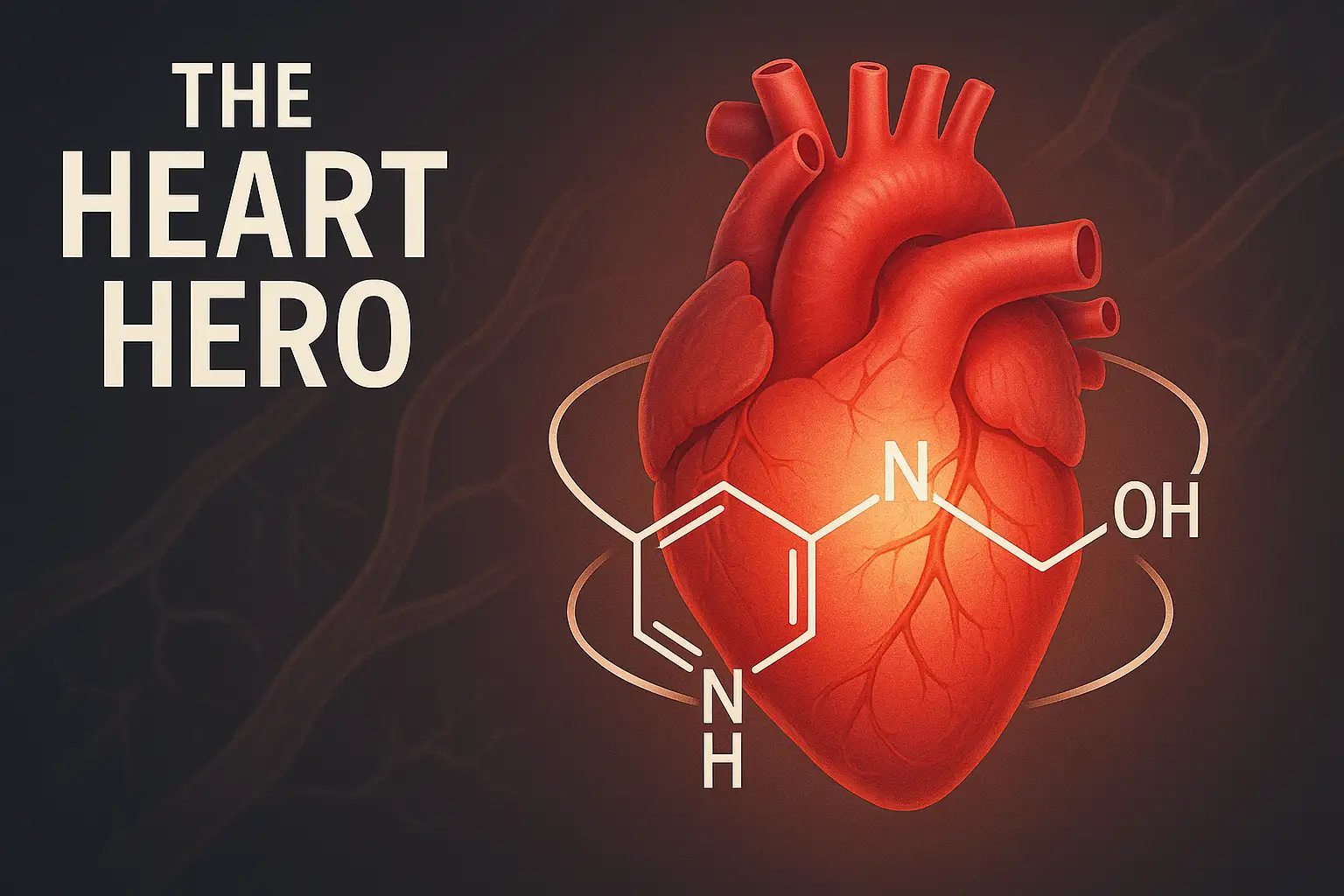Niacin B3, commonly known as Vitamin B3, is an essential nutrient that plays a crucial role in numerous bodily functions. This vitamin is a cornerstone of health and wellness, influencing everything from our cardiovascular system to mental health. It’s a water-soluble vitamin, which means it’s not stored in the body and needs to be replenished regularly through diet or supplements.
Niacin B3 is integral to converting food into energy, aiding in the metabolism of fats, carbohydrates, and proteins. This vital process ensures that our bodies have the necessary energy and resources for day-to-day activities. Moreover, Niacin B3 is a key player in maintaining healthy skin and nerve function, further underscoring its importance in overall health.
One of the most notable roles of Niacin B3 is its contribution to heart health. It aids in reducing harmful cholesterol levels while increasing good cholesterol, thereby promoting a healthier cardiovascular system. This function of Niacin B3 has been the subject of numerous studies, solidifying its place as a beneficial nutrient for heart health.
Niacin B3 is also recognized for its potential in improving mental health. It has been studied in the context of treating depression and managing schizophrenia, offering a glimpse into the diverse therapeutic applications of this vitamin.
The nutrient is naturally present in many foods, including meats, fish, nuts, and certain vegetables. For those unable to meet their Niacin B3 needs through diet alone, supplements are available, though it’s always advisable to consult with a healthcare provider before starting any supplement regimen.
In summary, Niacin B3 is a multifaceted vitamin essential for various bodily functions, from energy production to maintaining a healthy heart and mind. Its widespread impact on health makes it a nutrient that cannot be overlooked in any balanced diet.
Niacin B3: A Comprehensive Treatment for Heart Disease
Niacin B3, also known as Vitamin B3, has garnered significant attention in the medical community for its substantial benefits in heart health. This section delves into how Niacin B3 contributes to cardiovascular wellness and its crucial role in purifying the arteries, positioning it as a comprehensive treatment for heart disease.
The Cardio-Protective Role of Niacin B3 At the core of its benefits, Niacin B3 plays a pivotal role in managing cholesterol levels — a key factor in heart disease. It effectively lowers Low-Density Lipoprotein (LDL) cholesterol, commonly referred to as ‘bad cholesterol,’ which is known to clog arteries and increase the risk of heart attacks and strokes. By reducing LDL levels, Niacin B3 helps minimize one of the primary risks associated with heart disease.

Elevating Good Cholesterol Niacin B3 goes a step further by raising High-Density Lipoprotein (HDL) cholesterol, or ‘good cholesterol.’ HDL cholesterol is beneficial because it aids in removing other forms of cholesterol from the bloodstream. High levels of HDL cholesterol are linked to a reduced risk of heart disease, as they help keep arteries clear by transporting cholesterol to the liver, where it can be processed and eliminated from the body.
Purifying the Arteries One of Niacin B3’s most significant contributions to heart health is its ability to improve arterial health. It not only lowers bad cholesterol but also helps to remove the buildup of plaque in the arteries. This process, known as ‘arterial purification,’ enhances blood flow and reduces the likelihood of arterial blockages that can lead to severe cardiovascular events.
Beyond Cholesterol: Other Heart Health Benefits Apart from its impact on cholesterol levels, Niacin B3 is also known to help lower triglycerides, another type of fat in the blood. Elevated triglycerides are a risk factor for heart disease, and their reduction further strengthens the heart-protective qualities of Niacin B3.
Safety and Efficacy While Niacin B3 is a powerful tool in heart disease treatment, it’s crucial to use it correctly. Over-the-counter supplements are available, but it’s essential to consult with a healthcare professional before starting any new supplement, especially for individuals with pre-existing health conditions or those taking other medications.
Incorporating Niacin B3 into Your Diet Niacin B3 is naturally present in various foods, including lean meats, fish, peanuts, and avocados. A balanced diet can help maintain adequate Niacin levels, which is crucial for heart health.
In summary, Niacin B3 is a multifaceted vitamin that plays a vital role in maintaining heart health. Its ability to manage cholesterol levels, purify arteries, and lower triglycerides makes it an invaluable component of heart disease treatment and prevention.
Combatting Depression with Niacin B3
The role of Niacin B3 in mental health, particularly in treating depression, has become a subject of increasing interest in the medical community. This section explores the effectiveness of Niacin B3 in combating depression and its mechanism of action in mood regulation.
Niacin B3: A Potential Ally Against Depression Depression, a common but serious mood disorder, affects millions of people worldwide. Traditional antidepressants work for many, but not all, and this is where Niacin B3 shows promise. Studies suggest that Niacin B3 can be an effective supplement for improving symptoms of depression.
How Does Niacin B3 Aid in Treating Depression? Niacin B3 plays a crucial role in the production of serotonin and other neurotransmitters that are vital for mood regulation. Serotonin, often referred to as the ‘feel-good’ neurotransmitter, is essential for maintaining mood balance. Low levels of serotonin are commonly linked with depression.
Niacin B3 contributes to the synthesis of serotonin by participating in the conversion process of tryptophan, an amino acid, into serotonin. This increased production of serotonin can help alleviate symptoms of depression, such as sadness, hopelessness, and irritability.
Enhancing Brain Health and Function Apart from serotonin production, Niacin B3 is also essential for overall brain health. It aids in brain cell repair and improves brain function, which is crucial for individuals dealing with depression. Adequate levels of Niacin B3 ensure proper brain function, potentially alleviating some of the cognitive symptoms associated with depression, like difficulty concentrating and foggy thinking.
Safety and Dosage Considerations While Niacin B3 has shown potential in managing depression, it is important to approach its use with caution. High doses can lead to side effects, and it’s essential to consult with a healthcare professional before starting any new supplement, particularly for those with pre-existing health conditions or those taking other medications.
Incorporating Niacin B3 for Mental Well-being In addition to supplements, incorporating Niacin B3-rich foods into the diet can be a natural way to boost its levels. Foods like turkey, chicken, peanuts, and mushrooms are excellent sources of Niacin B3.
Niacin B3 emerges as a promising supplement in the fight against depression. Its role in serotonin production and brain health makes it a valuable component of a holistic approach to treating mood disorders. As research continues to evolve, Niacin B3’s place in mental health treatment could become even more significant.

Niacin B3’s Impact on Schizophrenia Treatment
Schizophrenia, a complex mental health disorder characterized by distortions in thinking, perception, emotions, language, sense of self, and behavior, has been a challenging condition to treat effectively. However, emerging studies, including those by psychiatrist Abram Hoffer, suggest that Niacin B3 could play a significant role in the management of schizophrenia.
Understanding Niacin B3’s Role in Schizophrenia Management Niacin B3, also known as Vitamin B3, has gained attention in the psychiatric community for its potential benefits in treating schizophrenia. This vitamin is essential for brain health and function, and its deficiency has been linked to various mental health disorders.
In schizophrenia treatment, Niacin B3 is believed to aid in the repair and building of neural pathways, which can be impaired in individuals with schizophrenia. The vitamin’s role in producing crucial neurotransmitters also suggests that it could help in regulating the chemical imbalances often seen in schizophrenia.
Abram Hoffer’s Pioneering Studies on Niacin B3 The late Dr. Abram Hoffer, a Canadian psychiatrist, was a pioneer in researching the therapeutic effects of Niacin B3 on schizophrenia. Hoffer’s studies in the mid-20th century proposed that large doses of Niacin B3 could not only improve symptoms but also potentially lead to symptom remission in some schizophrenia patients. His work, though initially controversial, opened the door to considering nutritional therapy as part of schizophrenia treatment.
Mechanism of Action Niacin B3 is thought to work in schizophrenia by affecting the brain’s use of glutamate, a neurotransmitter that is often dysregulated in schizophrenia. By modulating the glutamate pathways, Niacin B3 may help to stabilize mood and improve cognitive function in people with schizophrenia.
Clinical Trials and Evidence Despite Hoffer’s optimistic findings, subsequent clinical trials have yielded mixed results. While some studies support the efficacy of Niacin B3 in reducing schizophrenia symptoms, others have not found significant benefits. This inconsistency suggests that more research is needed to fully understand the role of Niacin B3 in schizophrenia treatment.
Safety and Considerations in Use As with any supplement, it’s important to use Niacin B3 under medical supervision, especially when dealing with a complex condition like schizophrenia. Dosage and potential interactions with other medications must be carefully managed.
The exploration of Niacin B3 in schizophrenia treatment, inspired by Abram Hoffer’s studies, has opened up new avenues in managing this challenging condition. While further research is necessary to conclusively determine its efficacy, Niacin B3 remains a subject of interest for its potential role in mental health treatment.
Niacin B3 as a Remedy for Rheumatism
Rheumatism, encompassing a range of musculoskeletal disorders including arthritis, involves inflammation and pain in the joints and muscles. In the quest for effective treatments, Niacin B3, or Vitamin B3, emerges as a potential ally. This section discusses how Niacin B3 can help alleviate rheumatic conditions, offering new hope to those affected.
The Role of Niacin B3 in Alleviating Rheumatic Symptoms Niacin B3 plays a vital role in the body’s general health, particularly in maintaining the health of the skin, nerves, and digestive system. In the context of rheumatism, its anti-inflammatory properties are especially beneficial. Niacin B3 helps to reduce inflammation, one of the primary causes of pain and discomfort in rheumatic conditions.
Improving Joint Health and Mobility One of the critical ways Niacin B3 aids individuals with rheumatism is by improving joint health. It promotes better blood flow and circulation, which can help reduce joint stiffness and improve mobility. This improved circulation also aids in the delivery of essential nutrients to joint tissues, fostering a better healing environment.
Niacin B3’s Pain Relief Potential Apart from its anti-inflammatory effects, Niacin B3 is also known for its role in pain relief. By aiding in the production of hormones and neurotransmitters that signal pain, it can help alleviate the chronic pain often associated with rheumatic conditions.
Safety and Dosage Considerations While Niacin B3 can be beneficial, it’s important to note that high doses can cause side effects such as skin flushing. As with any supplement, it should be used under the guidance of a healthcare professional, especially when dealing with chronic conditions like rheumatism.
Incorporating Niacin B3 in the Diet In addition to supplements, including Niacin B3-rich foods in the diet can be a natural way to boost its levels. Foods like turkey, chicken, fish, and peanuts are excellent sources of this vitamin.
Niacin B3 stands out as a potential remedy for those struggling with rheumatic conditions, offering a ray of hope for pain relief and improved joint health. As research continues, the role of Niacin B3 in treating rheumatic conditions may become even more prominent.

The Elixir for Youth: Anti-Aging Properties of Niacin B3
In the search for the fountain of youth, Niacin B3, also known as Vitamin B3, has emerged as a potent ally. This section examines the anti-aging properties of Niacin B3, shedding light on how this essential nutrient can help maintain youthfulness and vitality.
Understanding Niacin B3’s Role in Anti-Aging Niacin B3 plays a critical role in cell metabolism and DNA repair, processes fundamental to aging. As we age, our cells face increased oxidative stress and DNA damage, leading to visible signs of aging and decreased cellular function. Niacin B3 helps combat these effects by aiding in cellular repair and regeneration.
Boosting Skin Health with Niacin B3 One of the most noticeable benefits of Niacin B3 in anti-aging is its impact on skin health. It helps in building keratin, a protein that keeps the skin firm and healthy. Niacin B3 also reduces inflammation, a common culprit behind skin aging, and improves the skin’s barrier function, thus retaining moisture and protecting against environmental damage.
Enhancing Cellular Energy and Longevity Niacin B3 is vital for converting food into energy, a process essential for maintaining healthy cell function. By boosting cellular energy, Niacin B3 helps cells operate optimally, thus contributing to overall vitality and youthfulness. Furthermore, it stimulates a protein called sirtuin, which plays a role in cellular longevity and anti-aging.
Addressing Age-Related Health Concerns Beyond skin health, Niacin B3’s role in reducing cholesterol and improving brain function positions it as a comprehensive anti-aging solution. By addressing various age-related health concerns, Niacin B3 helps maintain not just physical appearance but overall well-being.
Safety and Usage While Niacin B3 offers promising anti-aging benefits, it’s important to use it responsibly. High doses can lead to side effects, and it’s crucial to consult a healthcare professional for personalized advice, especially when considering supplements.
Niacin B3 stands as a remarkable nutrient in the realm of anti-aging. Its ability to repair DNA, boost skin health, enhance cellular energy, and address age-related concerns makes it an elixir for youth, offering a holistic approach to aging gracefully.
Niacin B3: A Versatile Treatment for Skin Problems
Niacin B3, widely recognized for its myriad health benefits, has also made a significant mark in the realm of dermatology. This section explores how this vital nutrient, also known as Vitamin B3, addresses various skin issues, positioning it as a versatile treatment in skincare.
The Skin-Enhancing Benefits of Niacin B3 Niacin B3 is a powerhouse when it comes to skin health. Its role in repairing and protecting the skin is multifaceted. This vitamin helps build proteins in the skin and locks in moisture to prevent environmental damage.
Combatting Acne with Niacin B3 Acne, a common skin concern for many, can be effectively managed with Niacin B3. Its anti-inflammatory properties help reduce the redness and swelling associated with acne, while its ability to regulate oil production in the skin can prevent the formation of acne.
Niacin B3 in Treating Pigmentation and Age Spots Niacin B3 has shown promising results in reducing skin pigmentation and age spots. It works by inhibiting the transfer of pigment within the skin, which can lead to a more even skin tone and a reduction in the visibility of age spots.
Soothing Effect on Sensitive Skin For those with sensitive skin, Niacin B3 can be particularly beneficial. It helps to build the skin’s natural barrier, enhancing resilience and reducing sensitivity. By doing so, it minimizes redness and irritation, common issues in sensitive skin types.
Anti-Aging Properties Niacin B3 also possesses anti-aging properties. It helps to smooth skin texture and reduce the appearance of fine lines and wrinkles, making it a popular ingredient in anti-aging skincare products.
Safety and Usage While Niacin B3 is generally safe for topical use, it’s always best to conduct a patch test before applying it to a larger skin area. For those considering oral supplements of Niacin B3 for skin health, consulting with a healthcare provider is advisable to determine the appropriate dosage and to avoid potential side effects.
Niacin B3 emerges as a versatile and effective solution for a range of skin problems, from acne and pigmentation to aging and sensitivity. Its holistic approach to skin health makes it a valuable addition to skincare routines.
Boosting Energy and Activity with Niacin B3
Niacin B3, also known as Vitamin B3, plays a pivotal role in energy production, making it a key nutrient for enhancing energy levels and physical activity. In this section, we explore how Niacin B3 contributes to boosting energy and supports an active lifestyle.
Niacin B3: A Catalyst for Energy Production At the heart of its benefits, Niacin B3 is crucial for converting food into energy. It is a component of coenzymes NAD and NADP, which are involved in cellular metabolism. These coenzymes are essential for the breakdown of carbohydrates, fats, and proteins, transforming them into energy that the body can use.
Enhancing Physical Performance For those engaged in physical activities or sports, Niacin B3 can be particularly beneficial. By aiding in energy production, Niacin B3 helps in sustaining energy levels during exercise, enhancing overall physical performance. It’s not uncommon for athletes to include Niacin B3 supplements in their diet to boost their endurance and performance.
Reducing Fatigue and Improving Concentration Niacin B3’s role in energy production also translates to reducing fatigue and enhancing mental focus. Adequate levels of Niacin B3 ensure that the brain receives enough energy, which is vital for concentration and cognitive function. This makes Niacin B3 an important nutrient for both physical and mental activities.
Supporting Overall Well-being Beyond its direct impact on energy and activity, Niacin B3 supports overall well-being. A deficiency in Niacin B3 can lead to tiredness and low energy levels, highlighting the importance of maintaining adequate levels of this vitamin.
Dietary Sources and Supplementation Niacin B3 can be found in various foods, including meats, fish, nuts, and grains. For those who may not get enough Niacin B3 from their diet, supplements are an option, though it’s important to consult with a healthcare provider before starting any supplement regimen.
Niacin B3 is more than just a vitamin; it’s a vital nutrient for energy production and maintaining an active lifestyle. Whether for physical performance, reducing fatigue, or improving concentration, Niacin B3 plays a critical role in keeping the body energized and ready for action.
Niacin B3’s Role in Vital Bodily Processes
Niacin B3, a key nutrient also known as Vitamin B3, is indispensable for the human body, contributing to over 500 vital processes that maintain health and wellness. This section delves into the extensive role Niacin B3 plays in these essential bodily functions.
A Cornerstone in Metabolic Processes The primary role of Niacin B3 lies in metabolism — the process by which our bodies convert food into energy. It functions as a component of coenzymes NAD (nicotinamide adenine dinucleotide) and NADP (nicotinamide adenine dinucleotide phosphate), which are essential for the metabolic activities of cells. These coenzymes are involved in oxidative reactions that release energy from carbohydrates, fats, and proteins.
Supporting DNA Repair and Cell Health Niacin B3 is crucial in DNA repair and the maintenance of genomic stability. It aids in correcting DNA damage and plays a role in the cell cycle, ensuring healthy cell growth and replication. This function is particularly important in preventing cellular damage and aging.
Regulating Cholesterol Levels A well-known benefit of Niacin B3 is its ability to regulate cholesterol levels in the blood. It lowers LDL (bad cholesterol) and triglycerides, while increasing HDL (good cholesterol), thus playing a significant role in cardiovascular health.
Enhancing Brain Function and Mental Health Niacin B3 is vital for brain health and function. It supports the production of various neurotransmitters that are essential for cognitive functions and mental health, including memory, mood regulation, and concentration.
Supporting Skin Health Beyond its internal benefits, Niacin B3 is also important for skin health. It helps in the repair and maintenance of skin cells, protecting against sun damage and aging, and is often included in skincare products for its rejuvenating properties.
Niacin B3’s contribution to over 500 vital processes in the body underscores its importance as a nutrient. From energy metabolism to DNA repair, cholesterol regulation to brain function, and skin health, Niacin B3 is fundamental to maintaining overall health and wellness.
Niacin B3, a crucial vitamin also known as Vitamin B3, stands out for its multifaceted benefits that impact various aspects of health and wellness. This comprehensive guide has explored the wide-ranging roles and advantages of Niacin B3, highlighting its significance in maintaining and improving overall health.
A Nutrient with Diverse Health Benefits Niacin B3’s role extends from enhancing heart health and mental wellness to improving skin condition and boosting energy levels. Its effectiveness in managing cholesterol, aiding in treating depression and schizophrenia, and acting as an anti-aging agent for the skin, underlines its importance in both preventive and therapeutic health contexts.
Encouraging Balanced Nutrition and Supplementation While Niacin B3 is naturally present in many foods, the importance of a balanced diet rich in this nutrient cannot be overstated. For those unable to meet their requirements through diet alone, Niacin B3 supplements offer an alternative. However, it’s crucial to approach supplementation under medical guidance, considering the right dosage and potential interactions with other medications.
The Need for Professional Health Consultation Given the broad scope of Niacin B3’s health benefits, it’s advisable for individuals to consult healthcare professionals. This is particularly important for those with pre-existing health conditions or those seeking to use Niacin B3 for specific health concerns. Professional advice ensures safe and effective use of this vitamin, tailored to individual health needs.
Final Thoughts Niacin B3 is more than just a vitamin; it’s a key player in promoting and sustaining health. Its impact on over 500 vital bodily processes makes it an invaluable component of any health and wellness regimen. As research continues to reveal more about this essential nutrient, the potential of Niacin B3 in enhancing health and treating various conditions remains an area ripe for further exploration.
Conclusion
Niacin B3, a crucial vitamin also known as Vitamin B3, stands out for its multifaceted benefits that impact various aspects of health and wellness. This comprehensive guide has explored the wide-ranging roles and advantages of Niacin B3, highlighting its significance in maintaining and improving overall health.
A Nutrient with Diverse Health Benefits Niacin B3’s role extends from enhancing heart health and mental wellness to improving skin condition and boosting energy levels. Its effectiveness in managing cholesterol, aiding in treating depression and schizophrenia, and acting as an anti-aging agent for the skin, underlines its importance in both preventive and therapeutic health contexts.
Encouraging Balanced Nutrition and Supplementation While Niacin B3 is naturally present in many foods, the importance of a balanced diet rich in this nutrient cannot be overstated. For those unable to meet their requirements through diet alone, Niacin B3 supplements offer an alternative. However, it’s crucial to approach supplementation under medical guidance, considering the right dosage and potential interactions with other medications.
The Need for Professional Health Consultation Given the broad scope of Niacin B3’s health benefits, it’s advisable for individuals to consult healthcare professionals. This is particularly important for those with pre-existing health conditions or those seeking to use Niacin B3 for specific health concerns. Professional advice ensures safe and effective use of this vitamin, tailored to individual health needs.
Final Thoughts Niacin B3 is more than just a vitamin; it’s a key player in promoting and sustaining health. Its impact on over 500 vital bodily processes makes it an invaluable component of any health and wellness regimen. As research continues to reveal more about this essential nutrient, the potential of Niacin B3 in enhancing health and treating various conditions remains an area ripe for further exploration.
Resources
- Academic Journals and Research Papers: Websites like PubMed (pubmed.ncbi.nlm.nih.gov), Google Scholar (scholar.google.com), and ResearchGate (www.researchgate.net) are excellent sources for finding scientific studies and research papers on Niacin B3.
- Health and Medical Websites: Trusted websites such as Mayo Clinic (www.mayoclinic.org), WebMD (www.webmd.com), and Healthline (www.healthline.com) often provide detailed information on vitamins, their benefits, sources, and recommended dosages.
- Nutrition and Dietetics Resources: The Academy of Nutrition and Dietetics (www.eatright.org) and the USDA’s MyPlate (www.myplate.gov) offer guidance on nutrition and dietary sources of vitamins, including Niacin B3.
- Government Health Departments: Websites of government health departments like the National Institutes of Health (NIH) (www.nih.gov) and the Centers for Disease Control and Prevention (CDC) (www.cdc.gov) can provide reliable information on the nutritional value and health benefits of Niacin B3.
- Books and Publications: Look for books by nutritionists and health experts. Online bookstores or libraries may have titles specifically about vitamins and their role in health and wellness.


0 thoughts on “Niacin B3’s Unique and Unmatched Role in Heart Care”